Edie Melson's Blog, page 14
May 24, 2025
Trusting God with Our Writing & Blooming When God's Time is Right

by Edie Melson @EdieMelson
The heart of man plans his way, but the Lord establishes his steps. Proverbs 16:9 ESV
It was early February and we should have had freezing temperatures, occasional flurries and dreary days. Instead, that year we’d been covered up with warm spring rains. Because of the unseasonable weather, the snowdrops and early flowers were blooming and they were absolutely gorgeous.
Flowers, I’ve noticed, don’t let the calendar dictate their actions. Instead they’re in tune with the actual circumstances where they find themselves. When all the factors are right, they bloom.
I’m a planner and a list maker. I don’t like surprises and I’m not all that fond of drastic change. When I get ready to do something, I have a timetable and I expect to be able to follow it. I want everything in place before I move forward.
This is especially true with my writing and with publishing. I have a schedule and a timeline. I make plans, work hard to prepare, and generally expect life to cooperate.
But life rarely follows my timetable as closely as I’d like.
Instead, God orders my days—even when I can’t see Him at work. And I have to say while I’ve frequently been disappointed during the process, I’ve never been disappointed in God’s ultimate outcome. He has proved—more times than I can count—how very trustworthy He is.
So slowly, I’m learning to trust the circumstances where God has me, and the progress He’s allowing. I try to lean into the opportunities to bloom instead of lamenting the fact that life isn’t operating according to my original plan.
TWEETABLETrusting God with Our #Writing & Blooming When God's Time is Right from @EdieMelson (Click to Tweet)
 Edie Melson is a woman of faith with ink-stained fingers observing life through the lens of her camera. No matter whether she’s talking to writers, entrepreneurs, or readers, her first advice is always “Find your voice, live your story.” As an author, blogger, and speaker she’s encouraged and challenged audiences across the country and around the world. Her numerous books reflect her passion to help others develop the strength of their God-given gifts and apply them to their lives. Connect with her on her website, through Facebook, Twitter and Instagram.
Edie Melson is a woman of faith with ink-stained fingers observing life through the lens of her camera. No matter whether she’s talking to writers, entrepreneurs, or readers, her first advice is always “Find your voice, live your story.” As an author, blogger, and speaker she’s encouraged and challenged audiences across the country and around the world. Her numerous books reflect her passion to help others develop the strength of their God-given gifts and apply them to their lives. Connect with her on her website, through Facebook, Twitter and Instagram.
Published on May 24, 2025 22:00
May 23, 2025
10 Ways to Reveal a Hero in Your Manuscript
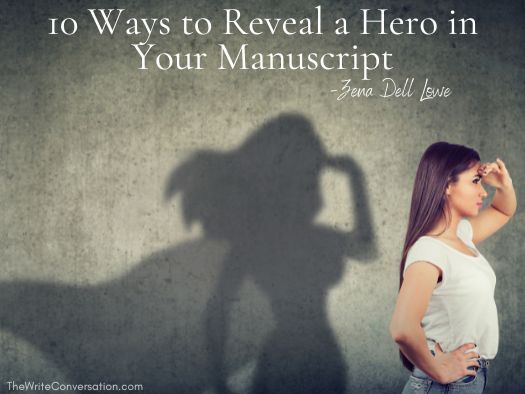
by Zena Dell Lowe @ZenaDellLowe
If your protagonist is the hero of the story—and let’s be honest, they usually are—then your job is to make sure the audience sees them as genuinely heroic. But how do you do that? What does heroism actually look like in a character?
Below are ten techniques to help reveal the noble qualities of a true hero—each one crafted to bring out the character’s internal greatness in meaningful, dramatic, and emotionally satisfying ways.
10 Ways to Bring Out a Hero's Greatness in Your Writing
1. Put them under pressure.True character is revealed by the choices someone makes when the heat is on.Example: Katniss Everdeen in The Hunger Games—thrust into life-or-death stakes, she volunteers for her sister, outsmarts the system, and never loses her humanity under fire.
2. Make them think outside the box.Great heroes don’t follow conventional thinking. They surprise us with unorthodox, inspired solutions.Example: Captain Kirk (Chris Pine) regularly proposes ideas so wild they sound like suicide—but they’re the only ones that work.Let your hero find a path no one else can see.
3. Force them to suppress personal grievances.Heroes put the mission before their own feelings. Maybe they have to work with someone they hate. That tension makes them bigger.Example: Tony Stark and Steve Rogers in Infinity War—personal wounds run deep, but the fate of the universe demands unity. They rise above their issues. That’s heroism.
4. Have them do the right thing—the right way.It’s not enough to do the right thing; the way they do it matters.Example: Batman (Christian Bale) in Batman Begins refuses to execute a prisoner even though it would “serve justice.”A real hero respects the dignity of all people—even villains.
5. Give them something noble to believe in.They must be guided by something greater than themselves—principles, truth, faith, or code.Example: William Wallace in Braveheart fights for freedom, not revenge.Even John Wick, as violent as he is, adheres to the "rules of the High Table.”This creates moral gravity and makes their choices meaningful.
6. Make it cost them something.Victory has to come with sacrifice—or it doesn’t mean anything.Example: Frodo sacrifices his peace, safety, and even his place in the Shire.Harry Potter walks into the forest ready to die.If there’s no personal loss, there’s no true heroism.
7. Show mercy and compassion.Real heroes care, especially for those with no power.Example: Maximus in Gladiator spares his enemies when he doesn’t have to.Samwise Gamgee shows kindness to Gollum, even when he doesn’t trust him.Empathy is the heartbeat of heroism.
8. Make the mission matter.Raise the stakes. Whatever your character is after must feel like the whole world depends on it.Example: Ethan Hunt in Mission: Impossible isn’t just stopping a nuke—he’s trying to save a single life that matters to him.It’s always personal and epic. That combination makes it resonate.
9. Let them show remorse.When they mess up (and they should), they own it. No excuses, no blame-shifting. Just raw honesty.Example: Peter Parker in Spider-Man 2 gives up being a hero, but eventually comes to grips with his responsibility.Repentance adds depth and earns trust with the audience.
10. Let them be afraid.Courage isn’t the absence of fear—it’s doing the right thing despite fear.Example: Marlin in Finding Nemo is terrified of the ocean, but he crosses it anyway to find his son.Fear makes your hero relatable. Facing it makes them noble.
These ten tools aren’t the only ways to build a great hero, but they’re some of the most powerful. Use them strategically throughout your story—not just in one defining moment—and your audience will fall in love with your protagonist for all the right reasons.
TWEETABLE10 Ways to Reveal a Hero in Your Manuscript from @ZenaDellLowe on @EdieMelson (Click to Tweet)
 Zena has worked professionally in the entertainment industry for over 20 years as a writer, producer, director, actress, and story consultant. Zena also teaches advanced classes on writing all over the country. As a writer, Zena has won numerous awards for her work. She also has several feature film projects in development through her independent production company, Mission Ranch Films. In addition to her work as a filmmaker, Zena launched The Storyteller’s Mission with Zena Dell Lowe, a podcast designed to serve the whole artist, not just focus on craft. In 2021, Zena launched The Storyteller’s Mission Online Platform, where she offers advanced classes and other key services to writers. Zena loves story and loves to support storytellers. Her passion is to equip artists of all levels to achieve excellence at their craft, so that they will truly have everything they need to change the world for the better through story.
Zena has worked professionally in the entertainment industry for over 20 years as a writer, producer, director, actress, and story consultant. Zena also teaches advanced classes on writing all over the country. As a writer, Zena has won numerous awards for her work. She also has several feature film projects in development through her independent production company, Mission Ranch Films. In addition to her work as a filmmaker, Zena launched The Storyteller’s Mission with Zena Dell Lowe, a podcast designed to serve the whole artist, not just focus on craft. In 2021, Zena launched The Storyteller’s Mission Online Platform, where she offers advanced classes and other key services to writers. Zena loves story and loves to support storytellers. Her passion is to equip artists of all levels to achieve excellence at their craft, so that they will truly have everything they need to change the world for the better through story.To find out more about Zena or her current courses and projects, check out her websites at WWW.MISSIONRANCHFILMS.COM and WWW.THESTORYTELLERSMISSION.COM
Published on May 23, 2025 22:00
May 22, 2025
How to Earn Money and Add to Your Writing Resume

by Lori Hatcher
Are you a new writer seeking to add credits to your writer’s resume? Would you like to earn extra cash to support all the paper, ink, and sticky notes you’ve been buying since you got serious about writing? Maybe you’d like to expand your reach and impact new audiences with your knowledge, insight, and passion?
Ten years ago, I was on a summer sabbatical from the Christian magazine I edited and wanted to use my time to find new places of publication for my devotions and Christian living articles.
I pulled out the most recent copy of the Christian Writers Market Guide. The CWMG is a print and online publication that lists, among many other things, hundreds of publications and publishers seeking submissions. It lists the publications by genre and includes details such as how and where to send your submission, word count, editor’s name, and payment amount.
I looked for publications seeking non-fiction submissions. Ten years ago, the CWMG didn’t have a spiffy online version, so I flipped through page after page, highlighting and dog-earing publications that were looking for unsolicited submissions in my genres.
Whenever I found one that looked promising, I visited its website and read the submission guidelines. Editors’ names and other important details change often, and we always want to use the most up-to-date information available.
Once I had my short list, I went to work.
Two Ways to Approach Writing Submissions
I approached submitting in two ways. If I had an unpublished article or devotion that fit the guidelines of a particular publication, I made sure the word count, Bible translation version, format, and tone fit the publication by reading samples online, if possible. Some places requested a query letter to tell them a little about myself and describe the content of my article or devotion. Others allowed me to submit the piece itself with no query. I followed the guidelines and submitted.
One time, I almost messed up. I was about to submit an article about how our electronics distract us from more important tasks and pursuits. Just before I hit Send, I reread the CWMG entry and realized I was about to submit a devotion about cell phone use to an Amish devotional. Whew! Learn from my almost-mistake—never rush to submission. Check and double check before you hit Send.
I used a different approach for other publications. If I didn’t have a piece already written that fit their guidelines or could be easily modified, depending on what they required, I either sent a query letter describing my idea or wrote a piece that fit the needs of the magazine or website. For example, I pitched two articles on parenting to a mom’s e-zine. After studying a magazine for seniors, I wrote an article about ten ways grandparents can share faith lessons with their grandkids.
I set a goal to submit three pieces each week during the summer. By the end of the season, I’d received quite a few “Thanks, but no thanks” replies. But I’d also received some acceptances. One query even netted an invitation to contribute paid bi-monthly feature articles. I wrote for that magazine for eight years (and even negotiated a raise after I’d established myself).
By intentionally seeking new avenues of publication, I grew in my ability to write to specs, earned money, made connections with new editors, and expanded my influence. I added new writing credits to my writer resume and shared my love for God with different audiences.
Summertime is a great time to pull out or pull up the Christians Writers Market Guide. Look through the entries and see who’s publishing what you enjoy writing. Reach out, submit your work, and see which doors God opens.
You may be delightfully surprised.
TWEETABLEHow to Earn Money and Add to Your Writing Resume from Lori Hatcher on @EdieMelson (Click to Tweet)
 Lori Hatcher is a freelance editor, writing instructor, and author of six devotionals with Our Daily Bread Publishing. Her latest book, THINK ON THESE THINGS: 60 THOUGHTFUL DEVOTIONS FOR RENEWED PEACE, released this month. Lori writes for Revive Our Hearts, Guideposts, Focus on the Family, The Upper Room, and Crosswalk.com. A frequent instructor at writers conferences around the country, Lori loves nothing better than helping other writers polish and perfect their craft. Connect with her at WWW.LORIHATCHER.COM.
Lori Hatcher is a freelance editor, writing instructor, and author of six devotionals with Our Daily Bread Publishing. Her latest book, THINK ON THESE THINGS: 60 THOUGHTFUL DEVOTIONS FOR RENEWED PEACE, released this month. Lori writes for Revive Our Hearts, Guideposts, Focus on the Family, The Upper Room, and Crosswalk.com. A frequent instructor at writers conferences around the country, Lori loves nothing better than helping other writers polish and perfect their craft. Connect with her at WWW.LORIHATCHER.COM.
Published on May 22, 2025 22:00
May 21, 2025
Flash Fiction Basics and Example
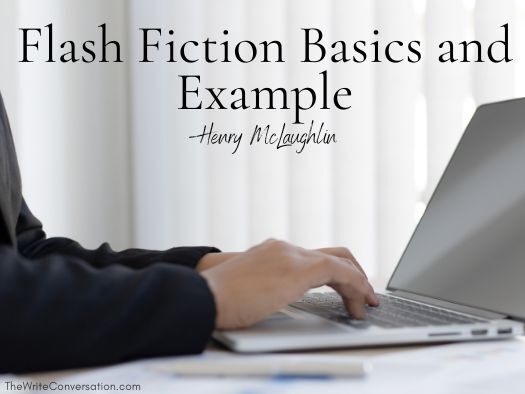
by Henry McLaughlin @RiverBendSagas
Have you ever written flash fiction? It’s a form of short story—a really short story. No more than 1500 words. A complete story in 1500 words or less! Can it be done? There are websites and ezines and contests for them all over the internet. One of the shortest pieces of flash fiction is six words long and attributed to Ernest Hemingway:
“For sale: baby shoes, never worn.”
Powerfully emotional, right?
I’ve written some pieces of flash fiction. I find Flash Fiction to be a good exercise for exploring my characters . A short piece helps me see some aspect of them I hadn’t noticed before—some part of their personality or backstory that helps me know them better and make them stronger throughout the story. In a short piece, the character may reveal aspects of themselves I hadn’t seen or grasped before.
What follows is a piece of flash fiction about the main character in my Riverbend series: Michael Archer.
The Only Way Out
“Keep yer nose clean, Archer. I don’t wanna see you in my jail again.” Sheriff Gideon Parsons’ voice graveled behind him.
I don’t want to see the inside of your jail again, either. Michael’s fists clenched in his leather gloves. But I probably will.
The deserted street stretched away, spilling into the plains beyond the town of Tramlaw. A pure white sheet of undisturbed snow encased the buildings, boardwalks, and hitching posts. Ice glazed the water troughs.
All shimmered in the early rays of sunrise peeking under the swollen gray clouds.
It reminded him of the first snowfall of winter back home, and the hope it brought of a different world upon waking. A hope soon dashed when his father stirred from drunken slumber.
Back then the snow only covered a world of pain. It didn’t change anything.
It was the same now.
Michael’s boot crunched the crusted top layer.
He strode down the middle of the street, the town to himself. Where to get a drink? Lulu’s would be the only place open this early, but he couldn’t afford her prices and didn’t want her girls pawing at him. That’s what got him in trouble to begin with. This time.
He angled for the livery. There should be half a bottle in his saddlebags. If Old Gabe hadn’t taken it to pay his fodder bill.
Michael winced as the door squealed on rusted hinges. His excuse for a horse dozed in a stall halfway down the row. His tack sat in dirty straw on the bare ground outside it, his saddlebags draped over the seat.
He opened the dry, cracked flap and found the familiar, comfortable shape of the bottle. It fit his palm as easily as his gun. The cork came out with a reassuring pop. Saliva stirred in anticipation of the first taste, the first swallow of his best friend and support.
The hard rim touched his bottom lip, and he tilted the bottle.
“That’s no escape.”
The glass clanked against his teeth and liquor spilled down his chin onto his shirt.
That blasted preacher again. Ought to be a law preachers must wear cowbells so they can’t sneak up a man tryin’ to clear his head.
Michael kept his back to the man and sucked a long draft. “Isn’t there some place your supposed to be? Like a church? Or a funeral? Or on your knees praying to somebody who doesn’t listen? Why bother people who never did you any harm and aren’t interested in what you’re peddlin’?”
Zechariah Taylor’s hand landed on his shoulder like a boulder. His other hand reached for the liquor. Michael turned away, stoppered the cork with a slap and slid his comforting friend into the inside pocket of his thick wool coat.
“It’s the curse of a preacher,” Taylor said, his voice resonating in the recesses of the barn, even though he spoke softly. “God won’t let me just preach to the saved. He wants me to reach the lost as well.”
Michael entered the stall and tossed the saddle blanket on the swayed back of his dull brown mare. “I’m not lost. Just need to get out of this town and away from people like you and that sanctimonious sheriff.”
“I can help you find a better escape from what ails you inside. Better than the booze and the whores. Better than the gambling. Better than fighting everyone.”
“I’m doing just fine.”
“Really? You’ve spent five of the last seven nights in Gideon’s jail. Doesn’t sound fine to me.”
Michael rocked the saddle into place and secured the cinch. He lashed the saddlebags and his blanket behind the cantle. Outside the stall, he mounted and looked into the gray eyes of the man who had visited him every day he was in jail. “Don’t need your help, Preacher.” He patted his pistol and the pocket where his whiskey lay. “I’ve got all the help I need. Only thing I need is to get away from this town and people like you.”
He spurred his horse onto the street and turned toward the plains.
It started to snow a half-mile out of town. Thick, silent flakes drifting down, smothering all sounds.
Two miles out of town only the trees marked the road.
Three miles later, the horse waded through snow up to its chest. The animal huffed clouds of steam as it struggled to breathe and walk. Michael let it set its own pace. He was in no condition to guide it or spur to greater speed. He drained the last of his whiskey and let the bottle fall to the snow.
A few miles later, Michael said, “Maybe we should find some shelter, you old nag.” The trees on each side blurred into one long wall of snow-covered evergreens.
The horse lurched and sank to its front knees. Michael slid from the saddle and landed on his back. Snow slipped inside his collar as he stood. He tugged on the reins.
The horse slumped to its side. No steam drifted from its nostrils.
Michael plopped to the ground and cussed.
This story revealed the depths of Michael’s despair before he came to Jesus. It helped me write a stronger more three-dimensional character which made the whole series better.
Have you ever written flash fiction?
What was your toughest struggle with it?
What was your biggest takeaway?
TWEETABLEFlash Fiction Basics and Example from author Henry McLaughlin (@RiverBendSagas) on @EdieMelson (Click to Tweet)
 Henry’s debut novel, Journey to Riverbend, won the 2009 Operation First Novel contest.
Henry’s debut novel, Journey to Riverbend, won the 2009 Operation First Novel contest.Henry edits novels, leads critique groups, and teaches at conferences and workshops. He enjoys mentoring and coaching individual writers.
Connect with Henry on his BLOG, TWITTER and FACEBOOK.
Published on May 21, 2025 22:00
May 20, 2025
May the Force Be With You: Pressing Through to Clarity in the Writing Journey
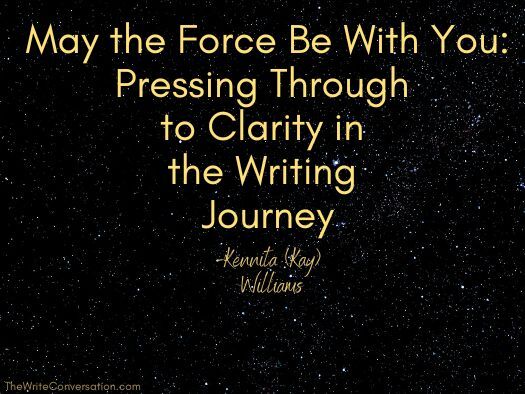
by Kennita (Kay) Williams
It was one of those mornings. The cursor blinked over and over, like a tiny reminder that I still hadn't written a single word, and every click of the keys felt forced. I had carved out time to write, set the mood with my favorite instrumental playlist, and even brewed my go-to medium roast Gevalia coffee. But nothing was flowing. My thoughts were scattered. My spirit felt cluttered.
I sat back in my chair, let out a heavy sigh, and whispered, “Lord, what do You want to say?” That simple question changed everything.
As writers—especially those of us called to communicate God’s truth—there’s a sacred tension we must learn to navigate: the tension between our human limitations and the divine inspiration available to us. If I’m honest, I’ve often tried to push through writer’s block with my own strength. I’ve brainstormed outlines, reworked drafts, and tried to force the flow. But here’s what I’ve learned: forcing words without inviting the true Force leads to burnout, not breakthrough.
The world says, “May the force be with you.” But we know better. We say, May THE Force—God’s Spirit—go before you, guide you, and write through you.
From Frustration to Focus
That morning, instead of powering through with my own ideas, I paused. I opened my journal and simply wrote this prayer:
“Holy Spirit, I’m listening. Show me what my reader needs. Quiet the noise within me so I can hear You clearly.”
I turned to Scripture and was drawn to John 16:13:
“But when he, the Spirit of truth, comes, he will guide you into all the truth…”
That truth hit me in a new way: I don’t have to figure it all out on my own. My job is not to impress—it’s to listen and obey. I thought back to the times God gave me clear downloads while washing dishes or walking outside. The issue wasn’t that I lacked creativity—it was that I had stopped seeking the Source.
The Clarity Comes in the Pause
In my work with leaders and communicators, I often teach a principle I call “The Power in the Pause.” It’s in the pause that clarity comes. The Holy Spirit is not rushed. He’s not driven by deadlines or distracted by comparison. He speaks in the stillness.
If we’re going to write words that heal, encourage, challenge, and point people back to Christ, we must return to the well daily. And that well isn’t a clever headline or a trending topic—it’s the living Word of God and the still, small voice that whispers truth to our souls.
Pressing Through with Purpose
That day, once I paused and prayed, the words began to come. Not in a flood, but in a focused stream. The fog lifted. The message sharpened. And I wrote—not from a place of pressure, but from peace.
What I’ve learned in my writing journey is this: clarity is a result of alignment.
When my spirit is aligned with His, the words are not just clear—they’re anointed.
We’re not just writing for likes or clicks—we’re writing for impact. And impact requires intimacy.
So the next time you sit down to write and the words won’t come…
Pause.
Pray.
Listen.
And let the true Force guide you.
Because God doesn’t just want to give you words—He wants to speak through your words.
A Final Word of Encouragement
If you’ve been feeling stuck, dry, or doubtful in your writing, you’re not alone. But you are called. And the One who called you is faithful to equip you.
May the Spirit of God breathe fresh wind into your writing this month.
May He ignite your creativity, illuminate your message, and renew your confidence.And yes…May the true Force be with you.[image error]
A Prayer for my fellow Writers:
Lord, thank You for entrusting us with words that matter. Help us to steward them well. When distractions rise, center us. When fear whispers, silence it with Your truth. May every sentence we write point people back to You. Be our Force. Be our guide. Amen.
TWEETABLEMay the Force Be With You: Pressing Through to Clarity in the Writing Journey from Kennita (Kay) Williams on @EdieMelson (Click to Tweet)
Dr. Kennita “Kay” Williams is a Visionary Leadership Coach, Author, Resilience Expert, and Wellness Advocate. Through her Business/Ministry, Clear Vision, she empowers leaders to navigate challenges, gain clarity, and lead with purpose. Dr. Kay’s mission is to inspire wholeness and healing. She can be contacted at www.clearvisionleader.com
Published on May 20, 2025 22:00
May 19, 2025
What's a Writer to Do While We Wait
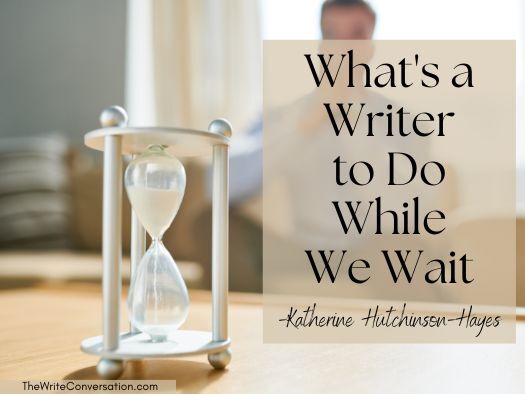
by Katherine Hutchinson-Hayes @KHUTCH0767
Waiting is one of the hardest parts of the writing journey. You’ve poured your heart into a manuscript, pitched to agents and editors, entered contests, and submitted proposals—yet, the answer hasn’t come. Or worse, it has, and it’s another no. Meanwhile, your calendar is full, your creativity is stretched, and your inbox is buzzing. You’re busier than ever, yet you’re still waiting for the yes that seems just out of reach.
I’m in the middle of that very season. I have multiple projects in the works—books, proposals, and editorial responsibilities. From the outside, it looks as if things are moving. But contracts haven’t landed. Doors haven’t opened. And there are moments when discouragement creeps in and whispers, “What’s the point? Who do you think you are? Why don’t you give up? No one cares what I have to say. My words don’t matter.”
But success doesn’t always come wrapped in contracts or bestseller lists. Sometimes, success is found in what we choose to do while we wait.
In those moments, I’ve learned to dig deep and encourage myself. I set small, attainable goals—writing a chapter, completing a blog post, mentoring a new writer—and I celebrate those wins. They may not make headlines, but they matter. Every step forward is a seed planted in faith.
I also prioritize being generous with my knowledge, my time, and my connections. When we help other writers rise, we rise, too. Celebrate others’ successes. Share a lead. Recommend a colleague. Cheer when someone else gets the yes you’re still praying for. Generosity breaks the grip of comparison and builds community in an industry that often feels isolating.
Most of all, I’ve learned to live thankfully. Even through rejection and setbacks, I’m grateful for the calling to write. I’m thankful for the opportunity to impact lives, even if it’s just one reader at a time. And I remind myself that God’s timing is perfect—even when it doesn’t match mine.
Don't waste the season if you’re in the waiting room of your writing career. Let it strengthen your character, sharpen your gifts, and grow your gratitude. Encourage yourself. Uplift others. Success will come—and when it does, your heart will be ready to receive it joyfully.
While navigating this waiting period, consider engaging with your writing community. Attend workshops, join writing groups, or participate in online forums. This not only provides you with fresh perspectives and inspiration but also fosters meaningful connections with fellow writers who understand your journey.
Sharing experiences, challenges, and victories can turn a solitary pursuit into a collaborative adventure. Remember that most writers have faced similar trials, and together, you can encourage one another, share valuable insights, and brainstorm new ideas. Making these connections can also open doors to new opportunities you might not have found alone.
7 Resources for Writers Who are Waiting
1. Writing Communities & Groups:National Novel Writing Month (NaNoWriMo): A challenge to write a novel in a month, offering community support.The Writer’s Guild: A community for writers that hosts events and provides resources.Critique Lounges & Writing Workshops: Look for local or online workshops on peer critique.
2. Industry Information:Writers’ Digest: Provides articles and resources on writing, publishing, and marketing.Publishers Marketplace: Great for tracking industry trends and discovering agents and publishers.
3. Self-Publishing:Reedsy: Offers a marketplace for self-publishing professionals and provides writing resources.IngramSpark: Helps authors publish and distribute their books globally.
4. Writing Tools:Scrivener: A powerful writing software designed for organizing long projects.Grammarly: An online writing assistant for grammar and style checking.
5. Podcasts & Blogs:The Creative Penn Podcast: Focuses on writing, publishing, and creative entrepreneurship.Write Now Podcast: Interviews with authors and discussions on writing craft.
6. Mentorship and Learning:The Association of Writers & Writing Programs (AWP): Offers resources for writers at all stages, including mentorship options.MasterClass: Online classes from established authors on various aspects of writing.
7. Gratitude Practices:The 5-Minute Journal: Encourages daily reflections on gratitude and progress.Gratitude Apps: Try apps like ‘Grateful’ or ‘Day One’ to maintain a gratitude log.
Using these resources will enrich your writing journey and foster a supportive environment that benefits all. Keep pushing forward, and remember, every waiting period can be a time for growth and learning.
TWEETABLEWhat's a Writer to Do While We Wait from @KHutch0767 on @EdieMelson (Click to Tweet)
 Dr. Katherine Hutchinson-Hayes is a review board member and contributor to Inkspirations (an online magazine for Christian writers), and her writing has been published in Guideposts. Her work in art/writing is distinguished by awards, including the New York Mayor’s Contribution to the Arts, Outstanding Resident Artist of Arizona, and the Foundations Awards at the Blue Ridge Mountains Christian Writer’s Conference (2016, 2019, 2021). She is a member of Word Weavers International and serves as an online chapter president and mentor. She belongs to FWA (Florida Writers Association), ACFW (American Christian Fiction Writers), CWoC (Crime Writers of Color),
Dr. Katherine Hutchinson-Hayes is a review board member and contributor to Inkspirations (an online magazine for Christian writers), and her writing has been published in Guideposts. Her work in art/writing is distinguished by awards, including the New York Mayor’s Contribution to the Arts, Outstanding Resident Artist of Arizona, and the Foundations Awards at the Blue Ridge Mountains Christian Writer’s Conference (2016, 2019, 2021). She is a member of Word Weavers International and serves as an online chapter president and mentor. She belongs to FWA (Florida Writers Association), ACFW (American Christian Fiction Writers), CWoC (Crime Writers of Color),AWSA (Advanced Writers and Speakers Association), and AASA (American Association of School Administrators). She serves on the nonprofit organization Submersion 14 board and the 540 Writer’s Community board and is an art instructor for the nonprofit organization Light for the Future. Katherine hosts the podcast Murder, Mystery & Mayhem Laced with Morality. She has authored a Christian Bible study for women and is currently working on the sequel to her first general market thriller novel. Her thriller A Fifth of the Story will debut in February 2024 through Endgame Press.
Katherine flourishes in developmental editing and coaching writers. She has a twenty-year career in education, leadership, and journalism. Katherine freelances as an educational consultant for charter schools, home school programs, and churches. In this role, she has written and edited curriculum, led program development, and helped manage growth facilitating and public relations. She also works as an editor and book coach through her consulting business. Katherine provides skill, accountability, and professionalism so clients can begin, develop, and finish their writing projects for publication.
Published on May 19, 2025 22:00
May 18, 2025
Use Your Writing Skills to Share Hope When You Feel Hopeless
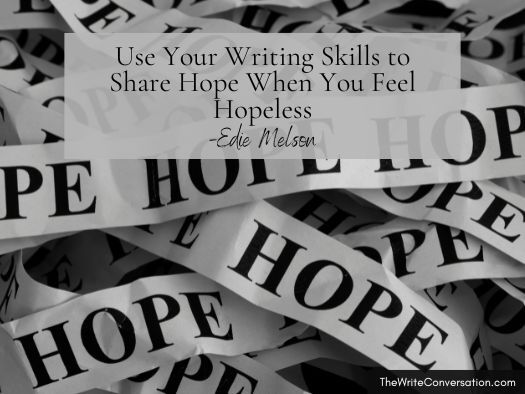
by Edie Melson @EdieMelson
Powerless uncertainty.
Sometimes those two words seem to sum up what it feels like to be a writer. There's something truly scary about being powerless. Combine that with the uncertainty about what was about to happen and it becomes a situation that can stop anyone in their tracks. Those are emotions every writing must learn to face and overcome. I believe one of the best ways to move forward is to take an honest look at powerlessness and uncertainty.
When we do examine these two things, we see can the lies we believe when we accept these lies as truth. And we see how we can replace them with action.
As believers, even though the events around us are uncertain, we have the ability to hold tight to the God of certainty.
Even more than that—as writers—we have the unique ability RIGHT NOW to share that certainty with the world.
Words do have power—Power for ChangePower for HopePower for Certainty
So how do we spread our words where they'll do the most good—and help us feel less powerless in the process?
Ways to Share Words of Hope
ONLINEWrite a blog post. Just like I'm doing now, if you have a website and/or blog, use it to share the certainty we have in Jesus. Write something positive on Facebook. Facebook is a good place to share a devotion or encouraging thought. And there's no better time than right now to do it. Make a meme. (Rhymes with seem.) A meme is a picture with words embedded on it. You can use AdobeSpark, Picmonkey, Canva, or even an app on your phone like WordSwag to create one. Tweet a meme or link to something positive on Twitter. Be sure to hashtag it (#) I recommend two or three of the most relevant hashtags to the tweet you send. Possibly #Faith #GodsLove #Positive #Encouragement etc.Begin a new board on Pinterest with something that will help those stuck at home. Maybe a crafts with kids board, or recipes, or positive quotes. Share a meme or beautiful picture on Instagram. You could write an accompanying devotion as a caption. I do that a lot on Instagram. You can follow my account (@STOP2PRAY) to see examples. Share something funny. It could be a video or a cartoon, or just something funny that happened to you. We can all use a good laugh right now. Ask questions. You could ask for suggestions for TV shows or movies to watch. You could also come up with a list of questions for others to answer. They could include questions like, "What's your favorite pie?" "Have you ever ridden a motorcycle?" etc. There are many floating around on social media, but don't limit yourself to those, make up one of your own. Begin an online gathering. I know several writers who have taken to FB Live and are sharing their skills in free mini-workshops. Others are starting online Bible studies. With today's technology, we can still gather together for encouragement. Don't forget the power of the STORY feature in Instagram and Facebook. When you post something in your story—as opposed to just a regular post—everyone will see it. I'm adding encouraging memes to my story in IG and FB every day.
OFFLINEDo you remember the good ole days? We actually got letters and cards in the mail! I think it's time to resurrect that practice. There are a lot of people out there who are lonely. Brighten their day with a letter. You could also call a local assisted living center and ask for addresses and send letters and cards there.
Truthfully, the more I worked on this post, the more ideas I had. But every post has to end somewhere! LOL! So now it's your time to chime in. What are some ideas you have to share words of hope during this season of challenge? Be sure to leave your thoughts in the comments section below.
Don't forget to join the conversation!Blessing, Edie
TWEETABLEUse Your Writing Skills to Share Hope When You Feel Hopeless - insight from @EdieMelson (Click to Tweet)
 Edie Melson is a woman of faith with ink-stained fingers observing life through the lens of her camera. No matter whether she’s talking to writers, entrepreneurs, or readers, her first advice is always “Find your voice, live your story.” As an author, blogger, and speaker she’s encouraged and challenged audiences across the country and around the world. Her numerous books reflect her passion to help others develop the strength of their God-given gifts and apply them to their lives. Connect with her on her website, through Facebook, Twitter and Instagram.
Edie Melson is a woman of faith with ink-stained fingers observing life through the lens of her camera. No matter whether she’s talking to writers, entrepreneurs, or readers, her first advice is always “Find your voice, live your story.” As an author, blogger, and speaker she’s encouraged and challenged audiences across the country and around the world. Her numerous books reflect her passion to help others develop the strength of their God-given gifts and apply them to their lives. Connect with her on her website, through Facebook, Twitter and Instagram.
Published on May 18, 2025 22:00
May 17, 2025
I’m A Writer
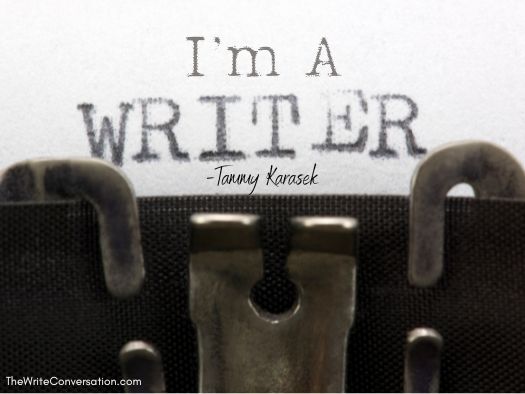
by Tammy Karasek @TickledPinkTam
I don’t know how you feel about the question “What do you do?” I know I tend to get a tad uncomfortable when asked this. As an author, I’ve heard fellow authors lament about this too, so I’m glad to hear I’m not the only one.
When asked this, I will offer up some pittance of stammering not willing to answer that question with the phrase “I’m a writer.” I wouldn’t be lying, I am a writer. I even have one book published and am included in a couple compilation books. Yet for me, it’s the questions that often follow that first one. “Oh, what do you write? What’s the title of your book? Where can I find it?”
Sigh.
True story here for you. Last year someone asked me this question . . . “Is it a book I’d even want to read?”
With a quick retort, I answered, “No you’d never want to read it.” And being the ornery one that I am, I changed the subject and asked the man a question about something else. I did have a little fun with that and kept my giggle inside as I stared and waited for his answer to my question I’d just asked him.
Once he closed his dropped jaw, he stuttered and said, “Wait a minute. Why did you tell me I wouldn’t want to read it? Is it a bad story?”
“No, but it’s not a story. It’s a book for other authors.”
His snarky question isn’t the norm, though. I do believe others are being kind when they ask what you write. I often don’t want to say the truth to them, but I often take on self-inflicted embarrassment once I’ve said out loud … “I write on my blog, I guest post, I’m writing and rewriting my third fiction story, but my fiction isn’t published yet.”
I’ve received the puppy dog eyes, the slight downturn of their lips and the dropping of the chin as they’ve softly said, “Oh, I thought you were a writer.”
Non-writing people have no clue the number of hours we writers spend putting the words down on paper, then edit and chop massive amounts of words back out of the project all toward the best possible story we can write. Many who don’t write for a living think it’s no big deal—sit down and write. Done.
I love Earnest Hemingway’s quote I think every one of us who do write have committed to memory: “There is nothing to writing. All you do is sit down at a typewriter and bleed.”
Sometimes it feels like it, am I right?
I want to encourage you today, though. As I share the exercise below with you, please know that I’m in the need to practice what I teach here. I need to do this exercise often. I’ll be honest and say that I’m not always a good listener of my own lesson, but the more I say it, the more I believe it.
I want us to do this together and I want us to say the phrase out loud. Nope, don’t care if there is anyone else in the room with you—that’s even better. They need to hear it, too. Remember, I’m saying it out loud with you. Ready?
Point to yourself and say the phrase . . . you are a writer.
Great job. Let’s make it more personal in this next part. Take a good, deep breath and out loud say … I am a writer.
What? Can’t hear you, once again only louder …
I’M A WRITER!
Great job. Honestly, this has been a tough one for me after the odd questions and comments I’ve received over the last couple of years. But, it’s okay. I keep telling myself, it’s part of the training, girl. Chin up. You can do this.
As I sit down to my computer or my notebook to write, I’m trying a new thing. Maybe this will help you as it’s helping me. I turn on my computer or open the notebook and say, “I’m a writer and now is my writing time.” Sometimes I have to repeat it a couple of times because the old devil wants to start an argument right then and there, but I don’t want that and I’ll just say it louder. It may seem silly, but if it works, it’s worth it!
Let me ask you this, friends … what do you do?
Ah, I heard you say it and I believe you. Yes. You’re a writer. Imagine that—I’m a writer, too.
What about you? Have you struggled with this question as a writer? If so, what is your tip or tips to help you overcome those dreaded situations that leave you—the word slinger—without words? Please share below your helpful suggestions for us.
TWEETABLEI'm a Writer, insight from @TickledPinkTam on @EdieMelson (Click to Tweet)
 Tammy Karasek uses humor and wit to bring joy and hope to every aspect in life. Her past, filled with bullying and criticism from family, drives her passion to encourage and inspire others and give them The Reason to smile. She’s gone from down and defeated to living a “Tickled Pink” life as she believes there’s always a giggle wanting to come out! A writer of Romance—with a splash of sass. She’s also The Launch Team Geek helping authors launch their books and also a Virtual Assistant for several best-selling authors. Don't miss her recent book, LAUNCH THAT BOOK, just released in November.
Tammy Karasek uses humor and wit to bring joy and hope to every aspect in life. Her past, filled with bullying and criticism from family, drives her passion to encourage and inspire others and give them The Reason to smile. She’s gone from down and defeated to living a “Tickled Pink” life as she believes there’s always a giggle wanting to come out! A writer of Romance—with a splash of sass. She’s also The Launch Team Geek helping authors launch their books and also a Virtual Assistant for several best-selling authors. Don't miss her recent book, LAUNCH THAT BOOK, just released in November. Her work was also published in a Divine Moments Compilation Book—Cool-inary Moments. She’s also the Social Media Manager for the Blue Ridge Mountains Christian Writers Conference, Founding President and current Vice-President of ACFW Upstate SC, and Founding President of Word Weavers Upstate SC. She’s a writing team member for The Write Conversation Blog, Novel Academy, MBT Monday Devotions, The Write Editing and more. Connect with Tammy at HTTPS://WWW.TAMMYKARASEK.COM.
Published on May 17, 2025 22:00
May 16, 2025
Get More From Your Writing Conference by Taking Advantage of Online Opportunities

by Edie Melson @EdieMelson
We are well into the spring season of Writing Conferences. Writers everywhere are returning and/or making plans to attend writing conferences. But in the midst of your preparation, be sure not to miss out on valuable connections that can more than double what you get out of these events.
Many writers have the mistaken idea that social networking is only beneficial online. Or that it only helps when you can’t be at an event. Not true.
While it’s true that networking online can help you plug in when you’re not at a conference or event—many miss the benefits of networking online before and during the conference.
Online Networking Benefits for Writers Attending a Conference:The ability to connect with others who’ll also be attending the conference. This can make coming to a huge event more like a reunion than a reason for anxiety medicine.The chance to find out what industry professionals are looking for in advance. It can also give you the opportunity to find out the way the interact with others and even some of their pet peeves.The opportunity for the faculty, staff, and other attendees to get to know you in a positive way. If you take the time to introduce yourself online and interact, you can already be ahead of the game when it comes to being remembered after the conference is over.The inside scoop. It’s an unwritten rule that the bigger the conference, the more last minute changes occur. You can be one of the first to know what’s happening and already have a plan in place before most of the attendees know what’s happening.So how do you make these valuable pre-conference connections? There are several ways and I recommend you use as many as you have time for. Not everyone is on all the social networks, so utilizing more than one can give you better results.
The very first place to start is on the conference website. As a conference director myself, I’m always amazed at the number of people who don’t take advantage of the resources we have on our site. It will definitely make you stand out in a good way if you take the time to read the info on the site.
So what info is valuable for online networking?First and foremost the conference blog. Frequently there’ll be guest posts from faculty with extra, valuable information. There also may be posts about the culture of the conference. By that I mean the expectations of those on staff and attending. What is the expected attire of attendees, are there any special events that require or expect attendees to dress up, even how many people will be there.e-Loops. These are email loops that provide the opportunity for attendees to interact with each other and/or the staff and faculty. Some conferences have different loops for different genres, others have one general loop, and still others offer something for first-time attendees. You’ll never know what’s available unless you look.Conference Facebook Page and/or Group. This is another opportunity to connect with attendees and faculty. Be sure to Like the page to take advantage of all the networking options.Conference Twitter Account. This is a great account to follow on Twitter because of the information that can be gleaned. You’ll also be able to find out what the conference #Hashtags are. (A hashtag is a number sign in front of a group of letters, numbers, and/or words. There are no spaces within a hashtag and this designation makes the hashtag searchable anywhere within the Twitter universe.)Faculty Page on the website. On this page you should be able to find the websites and blogs of the faculty. Or, if they’re not listed, you’ll at least get the correct spelling to make your own research easier.
So once you’ve exhausted the info on the conference site, then what? Why, it’s on the faculty and staff.
Here’s what to look for:Blogs and Websites: I start here because this is where most people go to find out about the faculty of a conference. Read the blogs and leave comments. The comments section is also a good place to eavesdrop and find other commenters who’ll be attending the conference.Facebook: Most people who have a blog have a way to connect with them on Facebook there. I don’t recommend you make professional relationships by friending someone (requesting they become your friend on Facebook). It’s better to let the professional take your online connection to the next level. So Follow their personal page or Like their professional page. You can comment on things they post there and continue the conversation you started on their blog. Once again, don’t neglect to notice who else is on there and whether or not they’ll be attending the conference.X (Twitter): With Twitter, the etiquette is slightly different so it’s a good idea to find all the faculty and Follow them on Twitter. It’s always a compliment to be mentioned on Twitter, so spread the word about blog posts and comments that have helped you.Instagram, Pinterest, LinkedIn, etc: All of these are good secondary routes to network prior to a conference, but I recommend them as a second line strategy rather than the first things you go to.
While You’re at the ConferenceNot all the value of social media occurs before the event. Social media is a great way to share the experience with tweeting and sharing pics on Facebook and Instagram.It will also cement you as one of the crowd, when sharing valuable quotes from others at the conference.As mentioned above, most events have an event hashtag and by following it, you can stay up-to-date with any schedule changes or announcements.You can also follow new contacts on social media while you’re with them at the conference.
While all of these things take time, they can exponentially increase the value of a single event. You’re spending good money to go a conference, take the time to get everything you can from it.
What tips have you found for using social media to get more value from a writing conference? Be sure to share your thoughts in the comments section below.
Don't forget to join the conversation!Blessings,Edie
TWEETABLEGet More From Your Writing Conference by Taking Advantage of Online Opportunities from @EdieMelson (Click to Tweet)
 Edie Melson is a woman of faith with ink-stained fingers observing life through the lens of her camera. No matter whether she’s talking to writers, entrepreneurs, or readers, her first advice is always “Find your voice, live your story.” As an author, blogger, and speaker she’s encouraged and challenged audiences across the country and around the world. Her numerous books reflect her passion to help others develop the strength of their God-given gifts and apply them to their lives. Connect with her on her website, through Facebook, Twitter and Instagram.
Edie Melson is a woman of faith with ink-stained fingers observing life through the lens of her camera. No matter whether she’s talking to writers, entrepreneurs, or readers, her first advice is always “Find your voice, live your story.” As an author, blogger, and speaker she’s encouraged and challenged audiences across the country and around the world. Her numerous books reflect her passion to help others develop the strength of their God-given gifts and apply them to their lives. Connect with her on her website, through Facebook, Twitter and Instagram.
Published on May 16, 2025 22:00
May 15, 2025
Writing Rejections Are Seeds to Writing Success
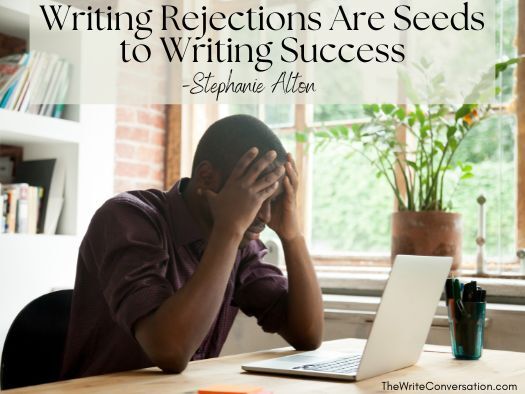
by Stephanie Alton
Before entering the publishing industry, I envisioned agents and editors like Hollywood celebrities. All of them would have mounds of money, nannies, cleaners, and assistants. These publishing elites could pick up the phone and whoever was on the receiving end would always answer with an enthusiastic yes—making the repped writer’s dream come true.
My vision was wrong. It seems the mound of money isn’t quite as tall, we all do our best to prioritize our families and do a good job at work, some have assistants and/or cleaners (but that is on my wish list), and no is the most common word I hear. If you’ve ever watched the Lego Batman movie, you know this is the perfect place to queue the No No No rap. As discouraging as this realty could be, I see my frequent rejections as seeds of success.
Wonder who in their right mind would tell an agent no & why?
Let’s start with editors. They’re lovely people, but they dish out more no’s than I care for. They have to and have some of the politest ways of doing so. Their no could be from a recent acquisition that is similar in nature to the project I just pitched. Maybe it’s because someone on the board doesn’t see the project selling well. Or the project or author just may not fit in that season for that publishing house.
I could continually beat myself up over not making a match. Or I can do something with the feedback. It's been through analyzing the feedback from the rejections that I have been able to better gauge what type of work or author fits where.
Who else tells agents no? Good question! Sometimes our clients tell us it is no longer working out for them. That’s right. Sometimes they breakup with us. Recently, I had one that came as a surprise. As I reported the news to my colleague, Blythe, she responded in sympathy describing exactly the pit in my stomach I was feeling. She’s been there. Her ability to show me that her scar matches my wound gave me a sense of comfort. I think as writers, that’s what we all aim to do, comfort others from the other side of pain.
Breakups still suck, but they too are seeds for success. It’s God revealing our paths are going in different directions and He’s making room for new people in the agency.
So why do agents reject so many and how do these noes become a seed for success? An agent telling you no is more of a not yet. We may see that your writing might not be ready for publication – as it was way for you to process your feelings. This is never wasted writing since it helped transform your heart by getting your thoughts on paper. They just aren’t organized in a way to be helpful to the reader – yet. The courage it took to share your not ready for publication story is the seed you planted to become a successful writer. Keep at it. You’ll find your way.
Sometimes our no is because we aren’t able to see how you will be able to sell many books. Yes. I’m referring to everyone’s least favorite topic. The platform. It’s ok. You can roll your eyes at me. I cringe a little at having to bring it up.
Your platform reveals a lot about how you are engaging with an audience in person, in ministry, through organizations, emails, podcasts, publications, media, and online outlets. These are your connection points for selling your future book, and with all things sales, the more the merrier. Each of these connections are seeds for success – even if it is not a monetary exchange.
Sometimes it is not you, it’s me. I try to keep my clients’ works’ from competing. I don’t want to sign multiple people at or close to the same time who talk about adoption and end up having to pitch those projects at the same time. It doesn’t go well. So, the no you receive from me could be about timing.
Whatever the case may be for your not yet response, know that a no from agent or editor is compassionate. We know that you have poured a lot into what you presented to us. So when you do receive a not yet, may it stir a little reactance in you. May you find a way to rework your message/story, or repurpose your work into an article, a guide, or series. May it fuel your fire in delivering a stellar message at a speaking gig, or to figure out how to grow your email list.
Rejections may sting as the soil breaks. But plant those seeds, tend to them, and watch your success grow.
CLICK TO TWEETWriting Rejections Are Seeds to Writing Success from Literary Agent Stephanie Alton on @EdieMelson (Click to Tweet)
 Stephanie Alton is a literary agent in the Christian market and marketer with The Blythe Daniel Agency, Inc. and represents non-fiction and select fiction works. She has been with BDA for 10 years splitting her time between the agency’s The Book Pod Interview & Review Network offering books for review, authors for interviews, and launch team management. Along with publicity campaigns, helping authors develop, and securing book deals with traditional publishers. Stephanie lives on the Texas Gulf Coast with her husband and two teens. She loves sunset cruising the bayou to the bay.
Stephanie Alton is a literary agent in the Christian market and marketer with The Blythe Daniel Agency, Inc. and represents non-fiction and select fiction works. She has been with BDA for 10 years splitting her time between the agency’s The Book Pod Interview & Review Network offering books for review, authors for interviews, and launch team management. Along with publicity campaigns, helping authors develop, and securing book deals with traditional publishers. Stephanie lives on the Texas Gulf Coast with her husband and two teens. She loves sunset cruising the bayou to the bay.
Published on May 15, 2025 22:00



